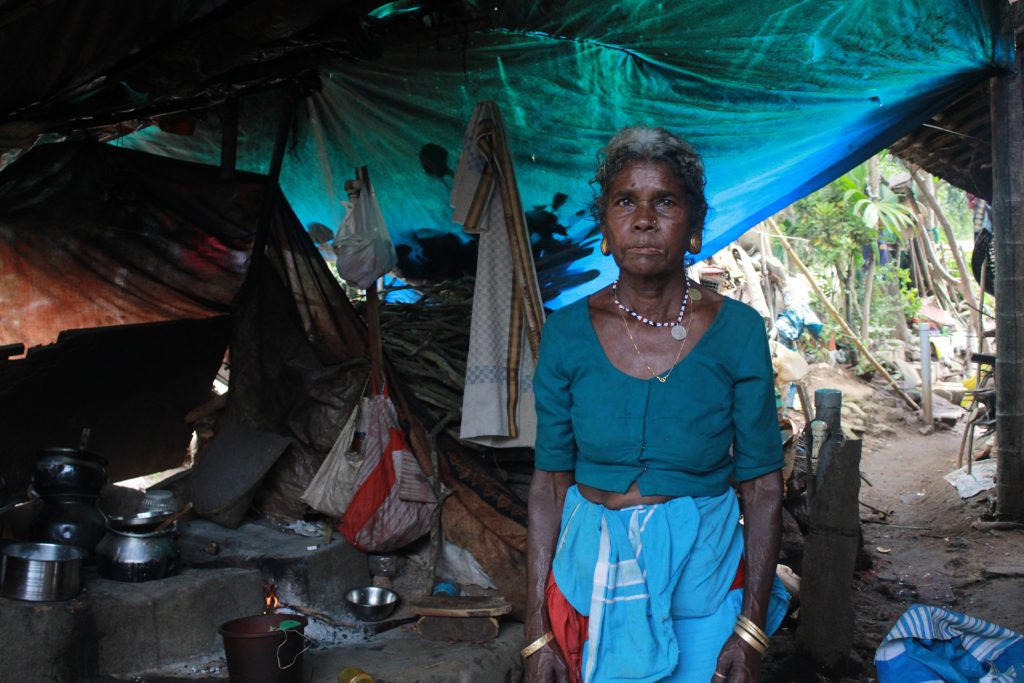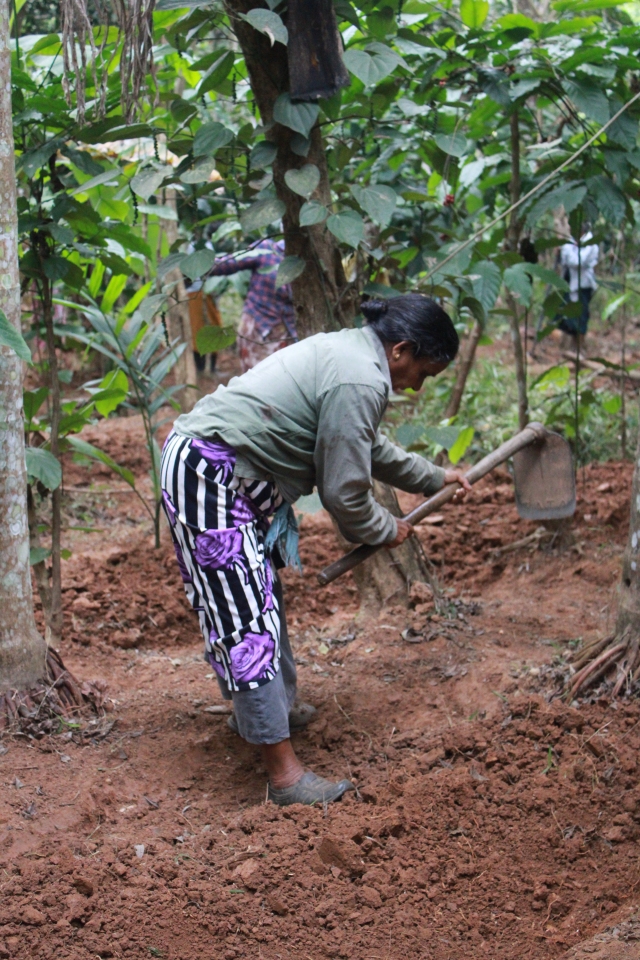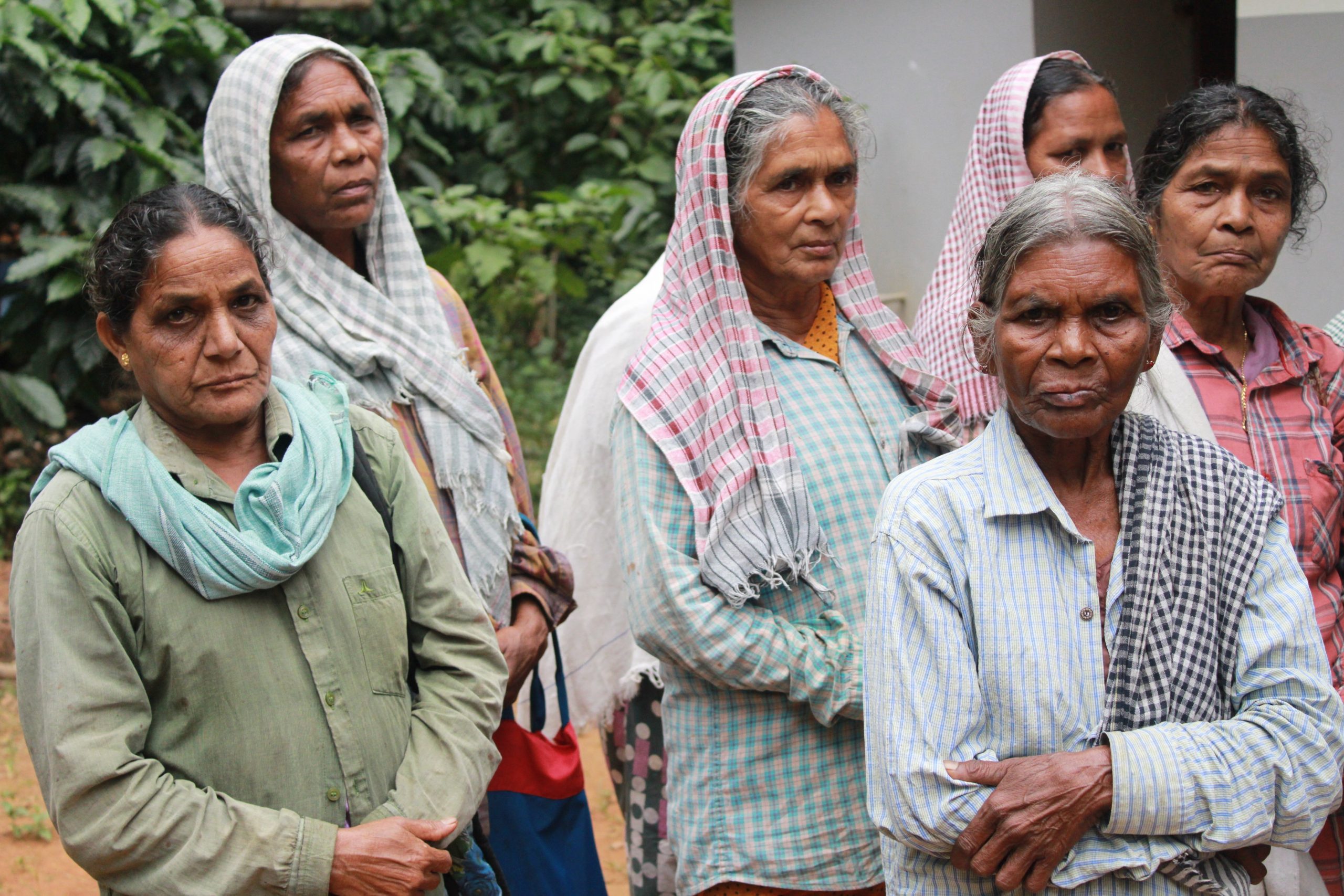Widows in Wayanad, Kerala’s poorest district, wait for their pensions which have been delayed for four months.
By Jaden Paul | January 5 , 2024
A narrow, worn road snakes through Wayanad’s hills in northern Kerala, leading to Purakkadi village. The higher it climbs, the closer it reaches to the sky. There in a whitewashed four-square building lives Lalitha Valsa with her 103-year-old mother-in-law Bhavani and son Vinayan.
Lalitha, faced a dilemma ever since her mother-in-law, whom she fondly calls ‘Amma’, fell ill. “She won’t be able to eat on her own, so I had to leave my job,” said 58-year-old Lalitha. The job allowed her to contribute to the household. Now, with no regular earnings, the widow’s pension disbursed by the government is her sole lifeline. This sum of Rs.1,600 allowed Lalitha to purchase essential medicines for herself without relying on others.
Across Kerala, thousands of women like Lalitha, who depend on the Indira Gandhi National Widow Pension Scheme (IGNWPS) for their livelihood, have not received their monthly pensions for four months. As of 2023, government data shows that 11,73,325 Kerala women rely on these pensions out of which 30,997 women are in Wayanad, The pension that was due for the month of August was disbursed in December.
In their 2021 election manifesto, the Left Democratic Front (LDF) pledged to provide pensions for housewives. Now in its second term, the LDF government has seen 2 years pass without any action on this promise.
Nella, a 70-year-old woman from the Paniya tribe, resides in the Pandalam tribal colony. The colony is full of shelters made with blue tarpaulin sheets and half-done houses. Nella chops wood from the fields where she works. With her earnings, she buys rice and whatever vegetables she finds. Having no land to grow vegetables in, she often eats kanji, (rice porridge).

Nella cooks food with the firewood she gathers from work.
Photo Credits: Jaden Paul
As a mother of six, Nella has faced widowhood for 30 years. Of her three sons, one passed away, another struggles with addiction, and the third, physically disabled, who doesn’t receive his disability pension timely. Despite marrying off her three daughters, she is often forced to borrow money from others. “I want the government to increase my pension by 10 rupees, whenever I get some work I try to pay off loans but I end up taking another one.”
One of her granddaughters lives with Nella. The child’s father passed away and her mother is missing, says Nella.
Yashoda, a member of the Kuruma community lives in Venoor, in a house that wears a patchwork of orange brick and grey cement. The promised government aid of Rs.4 lakh, which is given with each stage of construction completed, came to a halt as she could not afford to finish the construction. She has been working as a plantation worker for 30 years, with a daily income of Rs.333.
It has been two years since 60-year-old Yashoda’s husband Chathu, who himself was a plantation worker, passed away. A handful of rice is enough for her to eat two meals a day with the five-kilo ration received monthly.
With the cost of milk being Rs.50 per litre she does not use milk in her tea. “Only when my grandchildren visit, or if I really need it in my tea, do I consider buying milk.”

Three decades have passed since Yashoda first stepped into
coffee plantations for work. | Photo Credits: Jaden Paul
Yashoda, who does not know how to read and write but can sign her name, asks people around her for help when she needs to write something at the bank.
Usha Rajendran, a Panchayat member from Meenangadi town, works closely with farmers, women and the elderly. For her, the delay is not just bureaucratic, it is personal. The women come to the panchayat on the second or third of every month, expecting their pensions, but Usha and others can only say it has not been disbursed yet.
This Christmas did not bring any joy either as the government informed the panchayat that a payment for two months would be disbursed but only a month’s worth was released for August. The amount received was only Rs.1,300. No one has received the remaining amount. When Usha questions the government, she hears the same response every time- “financial crisis”.
Under the Indira Gandhi National Widow Pension Scheme, both the state and the central government pay Rs.1,300 and Rs.300 respectively to beneficiaries.
Kerala’s dependence on borrowing, fueled by increased budget for salaries and pensions has left the state with little to invest in infrastructure and development. Its growing elderly population and shrinking youth base, driven by low birth rates and overseas migration, are adding to the problem. By 2031, the state may become India’s first with more dependents than working-age adults, according to the state budget speech 2023-24.
“In Kerala, pensions are undertaken by Kerala Social Security Pension Limited. Over the years the number of beneficiaries has significantly increased. But, the entire borrowing was reduced from the public borrowing of the state government.”, said Thomas Issac, former Kerala Finance Minister, when asked about the problems in disbursement, “The company is going through delays because of the actions of the central government done with bad intentions. We have filed a case in the Supreme Court about this, it is coming up.”
The 15th Finance Commission designated Kerala to be a “highly debt stressed” state. The Union government earlier this year rejected the Kerala government’s request for Rs 8,000 crore of additional funds saying it violates the fiscal responsibility Act.
The State has filed a case in the Supreme Court against the centre for imposing limits on the State’s borrowing capacity. The State Government has said that the Centre has lowered the borrowing limit of the state. The fiscal deficit of the state was at 3.6% for the financial year 2022-23.
Many beneficiaries, often widows and the elderly, are denied pensions due to a verification process called “mustering.” Introduced to prevent fraud, mustering requires not only proof of life but also annual declarations from widows affirming they have not remarried. Old people and those who work in faraway fields often miss this process. Usha recollected a conversation she had with a 70-year-old widow recently, who asked her “How can I possibly remarry in this state?”
Mustering ends up as an income for the government as it is done through e-centers set up by the government called Akshaya, said Usha.
“People panicked thinking that their money has been robbed” referring to the partial payment which was received, said Shanti Sunil, a Panchayat ward member and a social worker with the NGO Neethi Vedhi, “So we had to make them understand and tell them that the government says they don’t have funds.”
E-mails sent to officials at the National Social Assistance Programme, Ministry of Women and Child Development, and Department of Finance, Kerala remain unanswered.
It’s been 15 years since Lalitha’s husband’s death. “I started stitching at home, but I can’t make money out of it because everyone around has a sewing machine at their home. Maybe once in a while someone comes with a blouse or saree, but that’s not an income. Everybody buys ready-made clothes, and people wearing sarees are also very few.”

